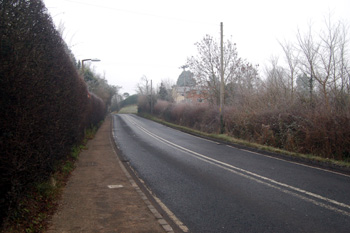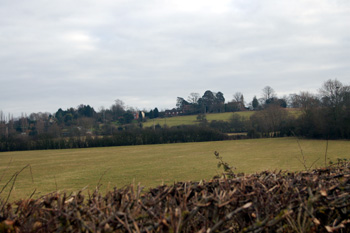
The Hill at Billington, December 2008
A key feature of Billington is the main road running through it. Two hundred years ago it was the responsibility of each community to maintain the roads which ran through it. Thus, Billington, although only a hamlet of Leighton Buzzard, was responsible for maintaining this road as well as the other roads in and around the village. If they did nothing to remedy the state of the road, the community was indicted before the county's Quarter Sessions. This system was a main contributing factor to the generally deplorable state of the country's roads as settlements resented spending money and labouring on something which largely benefited others, whether they were indicted for it or not.
In 1821 the road from Leighton Buzzard to Hemel Hempstead [Hertfordshire] was in a particularly bad state and the local magistrate, The Vicar of Totternhoe of two years, William Bruton Wroth, decided that something should be done. This action was probably influenced by the fact that he lived in Edlesborough [Buckinghamshire], further down the same road. He therefore duly raised the matter with the Quarter Sessions who ordered that the road be improved. The villagers duly knuckled down and sought to find the money to pay. Unfortunately for them, Wroth then had the bright idea of improving the hill be taking some off the top and making a lesser gradient. Naturally, this would cost even more, so he wrote to James H. Leigh, a prominent landowner in the district on 17th December [KK866]: "I have troubled with this letter to request of you a Subscription in aid of repairing a road belonging to the Hamlet of Billington, in which I am informed you have considerable property".
"During the last four years, I have repeatedly requested the Parishioners of Billington to repair that part of the road leading from the Town of Hemel Hampsted [sic] to Leighton Buzzard which was in their Hamlet. This they had neglected to do and I was last year compelled to present it at the Quarter Sessions for Bedford. The presentment was respited one Session and as there appeared but little probability that they would do it of themselves, a Surveyor was appointed by the Court to make an estimate of the expence and afterwards to see the repairs done and the Court requested me as the nearest Magistrate for the County, to see that the work was done properly".
"The Road is now partly repaired, and the Surveyor states that it will be finished by next Autumn. The Expence [sic] is of course very heavy upon the Hamlet. I am not at all aware whether you are acquainted with the Village of Billington, or the road I have been speaking of."
"The Road passes over a very steep hill, indeed so steep as to be dangerous to the Public. The Surveyor and myself have examined the hill, and think that it might be so lowered and the ascent varied in such a way as very considerably to improve it. But as the order of the Court does not direct him to lower the Hill, it will when repaired be still a very great inconvenience if not dangerous to the public, and particularly to the Farmers of Billington, as they will be obliged to put one if not two horses to a waggon in order to get up this hill more than they would if it is altered in such a way as it may by a moderate expence be done".
"It is useless to call upon the Farmers of the Hamlet to do it, as they are excessively burdened by the road, as well as by their numerous poor".
"It has been mentioned to me by some of the people of Leighton that it should be done by subscription, and I have therefore made this application to you as a chief Landholder to request you will give us something in aid of this great improvement for the public and which would also so essentially benefit your own tenants. It is my wish that whatever is subscribed may be laid out by the Surveyor appointed by the Court. If a hundred Pounds can be raised, I think the job might be done. I beg the favour of an answer when it is my intention to make other applications to the different owners of property in the hamlet, but I have thought it right to make the first application to you as the greatest Landowner".

Billington Hill seen from the Little Billington road, January 2009
Thomas Lane Wood, Leigh's agent, hearing of Wroth's proposal tried to nip it in the bud by writing to Leigh on 20th December: "I beg leave to enclose you a Letter I have received from Mr. Monk your Tenant at Billington praying your kind assistance as the Roads in that Hamlet have been an enormous expence [sic] to the occupiers and are still likely to be so as Mr. Wroth is now wishing another very expensive alteration which the Hamlet is unable to bear".
"As Mr. Wroth will no doubt write to you upon this subject, pray allow me to suggest that whatever sum you may be pleased to subscribe may be given to your tenant in aid of the heavy expenses already incurred".
"Mr. Wroth is a very troublesome Gentleman and from some cause or other is putting the Hamlet to all the Expences he can".
Three days later Wood again wrote to Lord Leigh: "I have now the honor [sic] to return you the Revd. Mr. Wroth's Letter which you was so good as to send me and also beg to state the Property you have at Billington and the contents of the whole Hamlet"
Total Quantity in the Hamlet: 1,050 acres 3 roods
James H. Leigh: 131 acres 1 rood
In the hands of other proprietors: 919 acres 2 roods
"I hear the same application will be made to other Proprietors. The great Tythes and some other Property is under my care and I shall think it my duty to recommend whatever they may subscribe to be given to their Tenants and the occupiers. This I find is expected to be the case with other proprietors".
"I have remonstrated with Mr. Wroth who is a Friend of mine, as to putting this little Hamlet to so much expence but as his own House is in the adjoining Parish he still persists in having a good Carriage Road".
"The hill he mentions is a Steep hill but by no means dangerous as no accident or few if any have ever happened there to my knowledge and this [sic] are not times to call upon farmers to unnecessary expences in ornamental Improvements in Bye Roads".
"Mr. Wroth was appointed Surveyor in his own Parish but was found so expensive and oppressive that Lord Bridgewater whose Tenants complained have succeeded in getting the Roads out of his hands, and Lord Bridgewater and one of his tenants are now the present Surveyors of the Roads at Edlesborough".
"Mr. Wroth is a young Magistrate and considered troublesome".
It may seem as if Wood's statement that he was a friend of Wroth's was at odds with his stance on Wroth's great scheme but clearly he felt it was unfair to the tenants in the times of depression following the end of the Napoleonic Wars. He probably was friendly with Wroth to the extent that the latter was an Anglican clergyman, a splenetic outburst in a letter to Leigh showing that he had no time for nonconformists: "I have for a long time discountenanced the Radical Papers published at Aylesbury [Buckinghamshire] and have and will still continue to support the Bucks Eaton and Windsor paper and in order to give every aid to this useful paper (my Clerk Mr. John Flint is agent to it) and to check by every means in my Power the Poison its publication is calculated to infuse into the Minds of the People as in this place we are surrounded by Quakers, dissenters and Radicals of the worst kind but none more so than the Willis Solicitors. I am almost alone with the exception of Mr. Wilson the Curate and a few other friends as Church and King's Men".
James Leigh's reply to Rev. Wroth was as follows: "I should have returned an immediate answer to your Letter but I waited to inform myself some particulars respecting the subject of it. I find the Hamlet of Billington contains about 1,050 Acres of which I am the Proprietor of only 150 and previous to receiving you letter my Tenant James Monk applied for assistance, stating to me that in 2 Years the expence of his share in the repairing of the Road in the hamlet of Billington had amounted to £120. Under these circumstances and taking into consideration the present depressed state of the Farmers, means I cannot give my sanction to any expenditure which is not absolutely necessary. Am sorry to hear that the Roads were neglected and that you were obliged to present the one in question".